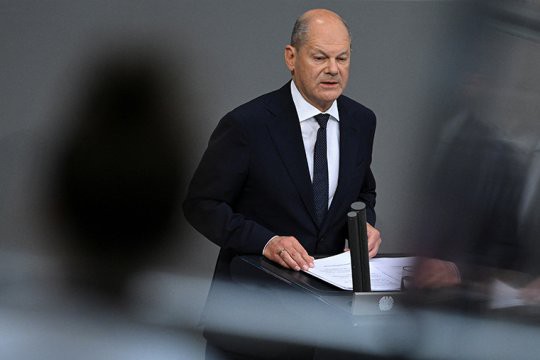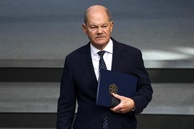The defeat in the elections to the European Parliament, along with a panic fear of the threat from “the right flank”, coupled profusely with the recent successes of the National Alliance in France, “prompted” slow-moving Bundeschancellor Olaf Scholz to frantically search for ways of repairing the ruined reputation of his Cabinet. There is only one year to go before the next elections to the Bundestag (if the elections do not take place earlier). Fully aware of the impossibility of stabilizing the economic situation in Germany, which is unimaginable without restoration of relations with Russia (at least, in the energy sphere), destroyed at the initiative of Berlin under pressure from the “overseas boss”, Scholz is tentatively entering “the field” of the Alternative for Germany.
At the beginning of July the federal government presented for parliament consideration a bill that allows to deport foreigners (in popular language, this elliptical and politically correct term is known as migrants), who commit crimes and incite violence, including in social networks. This was something unimaginable just a few months ago. It was the Social Democratic Party and the Alliance 90/the Greens that initially encouraged and defended with vigor various forms of migration and that became directly involved in everything that is happening in the migration sphere of the Federal Republic of Germany today. Dozens of interviews by politicians of every description along with colorful ads on TV persuaded ordinary Germans to demonstrate “tolerance and sympathy” towards migrants who “are doing their utmost” to make Germany “better, brighter and more versatile” in all areas, who “help” Germany to increase growth rate with their “qualified” labor and who do a lot to improve the demographic situation. Indeed, for migrants of every color represent a solid electoral foundation for traditional parties of the Federal Republic of Germany which support the import of multi-million hordes of migrants from countries ruined by western democracies, such as Iraq, Syria, Afghanistan and Libya. So what happened to Social Democrats, the Greens and the Free Democratic Party? What influenced their decision? Did Schol eventually resolve to face Germans, rather than turn his back on them? At first glance, this could be true. For, as the British Prime Minister Winston Churchill used to say, «silly is the one who never changes his opinion”. However, there is a need to look into the issue more thoroughly.
Right after the defeat in the parliamentary elections the German press was swamped by a host of reports about crimes committed by migrants. The day before, media reported that a 20-year-old German accompanying his sister after a graduation party in the northwest of the country was beaten to death, supposedly by a 18-year-old Syrian. A few days later, another Syrian, waving a machete, triggered a fight in the federal land Saar. Then a Somalian hit a man with a knife in Hamburg. And the “cherry on the cake” – a report about a horrible (no irony) murder of a police officer by an Afghan. Seemingly, not many crimes for a country with a population of 83 million. However, what is important is not only figures, but trends as well. The number of crimes in the Federal Republic of Germany last year went up by 6 percent, no more no less, compared to the year 2022. Significantly, given the total number of migrants (15 percent of the total population of Germany) they account for 41 percent of all offences in 2023. Thus, the number of illegal acts committed by migrants in 2022 increased by 23 percent, in 2023 – by 18 percent. «In the past two years Germany has become less safe, which is due to a rise in crime among foreigners», - Andrea Lindholz, Bundestag deputy from the Christian Social Union (it was the leader of this very party, Angela Merkel, who encouraged migration) acknowledges.
Amid all this, the chancellor’s plans look noble. However, it is hard to believe in their true intentions. There have been similar intentions before. Meanwhile, news media kept silent on grave crimes, including rape, pedophilia, mugging, cases of bullying of German children by migrants at schools. From the very outset of migration crisis in Europe cases of migrant-related crimes have long become everyday reality for German police, but not for the media. True, the Federal Republic of Germany is not as safe a country as it used to be. Many representatives of German elites continue to openly talk about it. But are they mooting the issue, without any fear of publicity, now? And the “anti-migrant” bill has arrived just in time. But if we look at it closer, the adoption of the bill is unlikely to radially affect the migrant crime situation in Germany. Many migrants have obtained German citizenship. Foreigners who were given asylum are protected against deportation by law. This means that only those with regular visas can be deported and only if they come from countries which Berlin deems as safe. For today, there are about 230,000 people who are subject to deportation in the Federal Republic of Germany. However, most of them have been provided with a special status which does not allow them to be sent home.
And still, does Scholz need settlement with migrants? Is he truly concerned about the security of Germans? The answer is evident. As long as the Alternative for Germany, actively exploiting the issue of migrants, is kicking and presents a threat, Scholz and his Social Democrats will be trying "to saddle this horse” in the media. They will think of another bill. They will show on TV how the Bundeschancellor is daily discussing the issue with western leaders, and even with “opposed to his democratic essence” “dictators” (not a big deal when it comes to a case of “government importance”), in an attempt to “defend” Germans against evil migrants. They will replace the reality with all-pervading ‘spin’ and the law-abiding burghers will “believe”. There are doubts, though, that Germans will continue to enjoy fairy dreams about “noble democracy and caring government”. In all likelihood, Scholz will be caught to answer for all this in autumn this year, when the elections will take place in Brandenburg, Saxony and Thuringia. He will not be able to get way with perfunctory measures or statements, or with shy smiles like after the elections to the European Parliament. He will have to report to fellow party members (and here, the comrades are unlikely to offer a hand). For this reason, the French scenario in the once stable Federal Republic of Germany seems fairly realistic.
The opinion of the author may not coincide with the position of the Editorial
read more in our Telegram-channel https://t.me/The_International_Affairs

 11:36 17.07.2024 •
11:36 17.07.2024 •



























